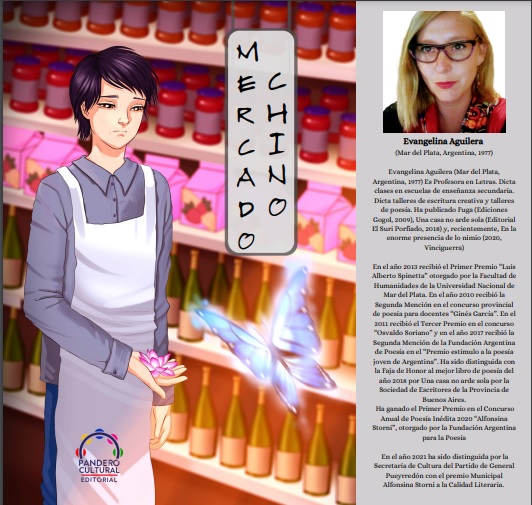Adelanto: Dos poemas de “Mercado Chino”, de Eva Aguilera
La escritora marplatense compartió algunos de los textos del libro bilingüe que se editó en México.

Cadena
En el supermercado chino
se trabaja el feriado y los primeros de año,
los domingos y el día del obrero
se trabaja
a como dé lugar
y el lugar siempre es grande
porque caben las góndolas
y la verdulería
del chico correntino
(que le dicen Abraham
porque se llama Abraham),
la fiambrería
y una carnicería
atendida por sus propios dueños
que no son los animales muertos
sino los vivos,
detrás del mostrador.
24
Detrás, también, hay un depósito
de donde sale Nico, que es el repositor
como de bambalinas reaparece
en una escena repetida
sin sentido.
Todo es absurdo en un supermercado chino:
todos los chinos se llaman Luis, Martín, Matías,
te cobran las bolsitas
y vos vas con tu sueldo
todos los días vas hasta que el sueldo
se acaba
como se acaba este poema:
sin más pena ni gloria.
Chain
At the Chinese market
they work on a bank holiday
and on New Year´s Day, on Sunday
and on the worker´s day.
They work depending on the place
and the place is always huge
´cause stalls fit in there
and the Correntine boy´s grocery too
(they call him Abraham because his name is
Abraham)
and the delicatessen
and the butcher´s run by its owners,
who are not the dead animals but the alive ones
behind the counter.
There´s a warehouse behind, too.
Nico, who is the stock boy, comes from there
as taken from a drop scene
he appears repeatedly and illogically.
26
Everything is ridiculous at a Chinese
supermarket:
all Chinese men are called Luis, Martín, Matías.
You pay for the plastic bags,
and you go there with your salary,
you go there daily
until your salary is over
the same way this poem is also over:
without trouble or fanfare
Pez
Shen Huang, cuando tocás tu pecho
no es tu corazón lo que palpita
sino la huida resbalosa de ese pez
que en la ribera del río Yangsté
se te fue de las manos.
Lo que te duele no es el cuerpo
sino lo que no pudiste retener:
las huecas persistencias entre tu piel y el mundo.
¿Su cara era una hoja de bambú?
¿Pelo de seda tenía la que entonces?
¿La yema de sus dedos de algodón?
Ahora no, Shen Huang,
ahora el día es áspero y de piedra
pleno de sombra y frío es el mercado.
Fish
Shen Huang, when you touch your chest
it is not your heart beating
but the slippery getaway of that fish
that flees from your hands
on the Yangtse river bank.
It is not your body what hurts
but what you were not able to sustain:
the squeezed persistency between your skin and
the world.
Was his face a bamboo leave?
Did his silky hair the one that then?
Was his fingertip made of cotton?
Not now, Shen Huang,
now the day is rough and made of stone.

